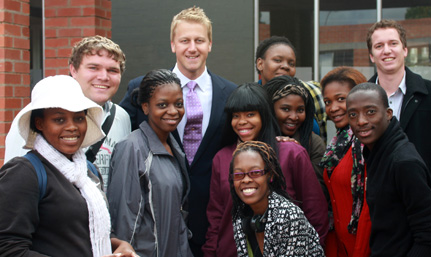|
 |
Gareth Cliff addressed graduates during the UFS Autumn Graduation Ceremony.
Photo: Lelanie de Wet
18 April 2013 |
Well-known radio personality and Idols South Africa judge, Gareth Cliff addressed graduates on the third day of the University of the Free State (UFS) Autumn Graduation Ceremony.
“It’s a good time be alive, a good time to be a South African, a good time to be a qualified South African,” Gareth said during the graduation ceremony of the Faculty of Natural and Agricultural Sciences.
He emphasised the importance of skills in science in South Africa nowadays. “The only way we can advance is through an education of our minds, through technology, through science, through maths. It’s a time in our country’s development that we require minds such as yours to propel us forward.”
Gareth also underlined the freedom of speech in South Africa, especially in the light of media freedom. “It is something I feel strongly about, something this generation takes for granted.”
Dr Khotso Mokhele, Chancellor of the university, reinforced Gareth’s message and said that graduates need to be able to take standpoint against issues.
Learners from schools in Thaba Nchu and Botshabelo also had the opportunity to attend the ceremony.
The Autumn Graduation Ceremony takes place until Friday 19 April 2013. Attached is the programme for this ceremony.
Friday 19 April 2013
09:30 Diplomas and certificates up to and including honours degrees in the Faculty of Economic and Management Sciences: all diplomas and degrees in the Faculty, except BCom and BComHons.
14:30 Diplomas and certificates up to and including honours degrees in the Faculty of Economic and Management Sciences: only BCom and BComHons.
The Qwaqwa Campus’ graduation ceremony will take place on 8 June 2013. Diplomas / certificates up to and including doctorates will be awarded at this ceremony.